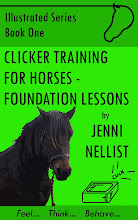In learning theory speak a 'reinforcer' is a consequence of an individual's action that makes them want to do it again. It is in the individual's view as to how valuable that reinforcer is to them. Animals of all species including is humans will prefer different reinforcers depending on their experience at the time.
Take A Little Hope for example. Five weeks before the first draft of this blog was written she was flat on the floor, devoid of energy and Death Of The Horses was towering over her, scyth in hoof. She had been abandoned to die and would have done if it were not for my friend's acting to save her. I helped just a little bit. In the beginning Hope wanted to sleep mostly and eat a little, preferably while lying down.
Fast forward five weeks she's beginning to find her feet...
She is beginning to learn about human intentions and interventions for life in my friend's world. Basic touch acceptance and leading are where she's starting. Scratching is her preferred reinforcer. She loves to be stroked and rubbed and scratched. She has been deprived of other equine contact recently. For her first two weeks we didn't know if she had contagious diseases such as strangles, and she had some lice we didn't want shared round the other horses. Humans were her only visitors. Since then Hope has been let loose from her stable twice to three times a day to roam the yard and talk to the other horses over the gate while I and my friend get on with the yard chores. She's gone grooming mad, especialy with my two mares who are cobby like Hope and fairly steady beasts most of the time. Hope has steadily become more grooming mad with us humans too. She does like a good scritch, it's only natural. She's none too keen on taking food from our hands at this stage, that's a bit weird - and something she does learn to do later, joining in with the big horses. Right now scratches are the thing, and a great way forwards for her education.
Bronwen and Hope grooming: https://youtu.be/7enkVt8ac-E
However, her love of scratches does lead us to a problem. Sight of a person arriving on the yard now is very positive to Hope and unleashes all her stored up desire to be in company and feel loved. What is not to like after the confines of her hospital bed?
So when Hope is eating she's happy and settled. When she's made her way over to the grass she is likewise. When she's talking to one of the other horses, ditto. She recognises when we are working, mucking out etc, and takes the hint that we are not availible and leaves us alone. But when we are just hanging out and she is not otherwise gainfully occupied, we are targets for her solicitations! A good sign she is feeling better, but also time for her to learn we can't just be pinned down to groom her forever.
Hope's modus operandi is to approach us with her ears back and to push into our space. It's more normal for horses to approach each other in a gentler fashion when seeking mutual grooming, and to only hesitate and turn ears back when close up to the grooming partner - just before getting stuck in to a session. Hope is still a little afraid of us, despite also having the knowledge that we groom. Not surprising really. She was weak and helpless when she was literally dragged up from the floor. Not the ideal introduction but needs must. Also, we have no idea of her previous humans...
Now is the time to show her that we'll come over to chat and give her scratches when she is settled and relaxed. We can call her name and make a definite start to an interaction with her. Then we can also begin to show her some of the things that will happen in future, such as halters and hoof care. Today I continued my friend's work, I turned my back to her and moved off a little way, waited for her to begin approaching me, said 'walk on' when she did to begin her association between this intended cue and walking with me - finishing this off with a good scratch.
Today A Little Hope is exceeding all expectations. I often stop to share a scratch, and often she stops by as I do yard chores to see what I'm doing, or tags along as I ride Penny and Bronwen in the paddock. She also brings great joy and comfort to my friend who rescued her. She's now a great big Hope :)






